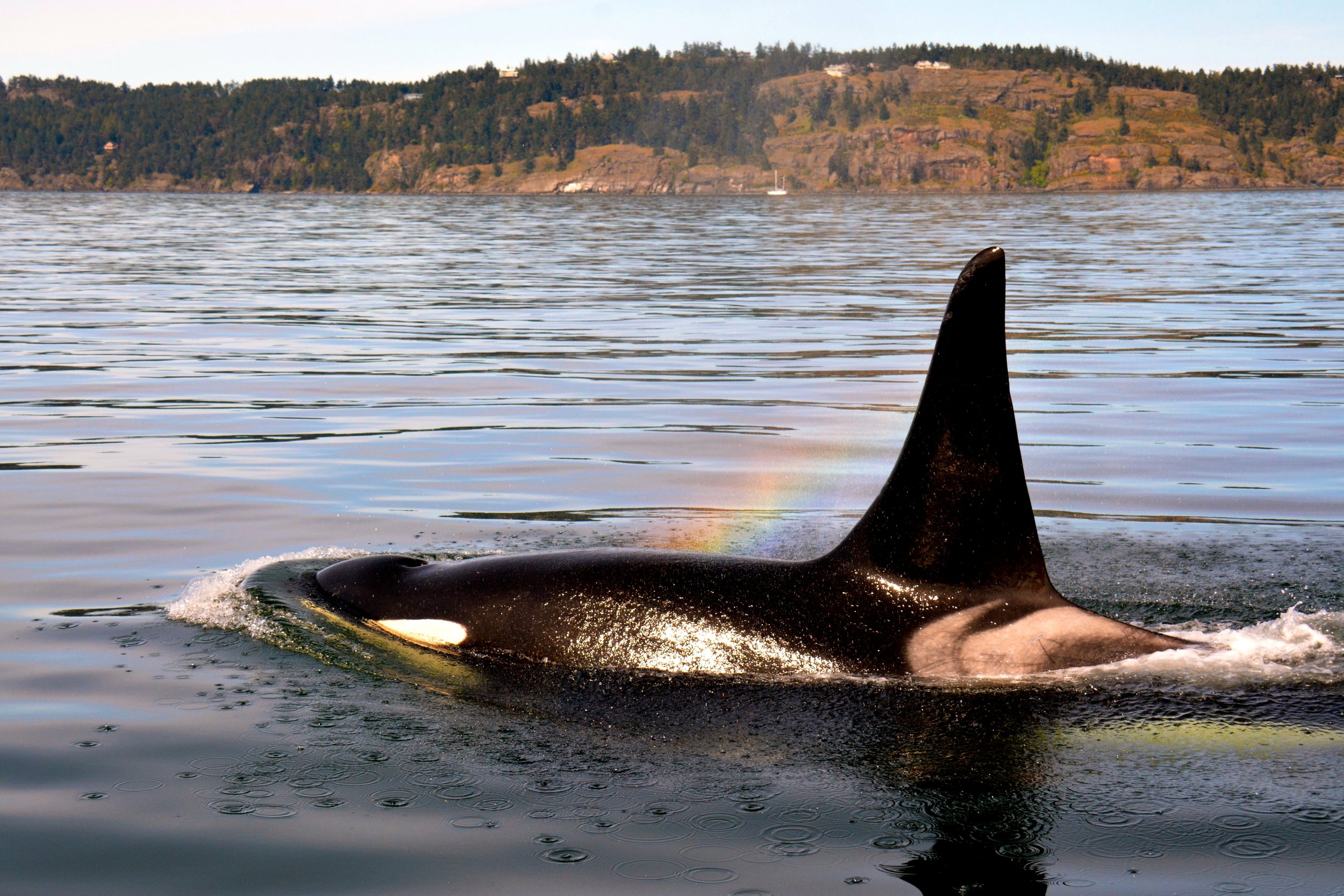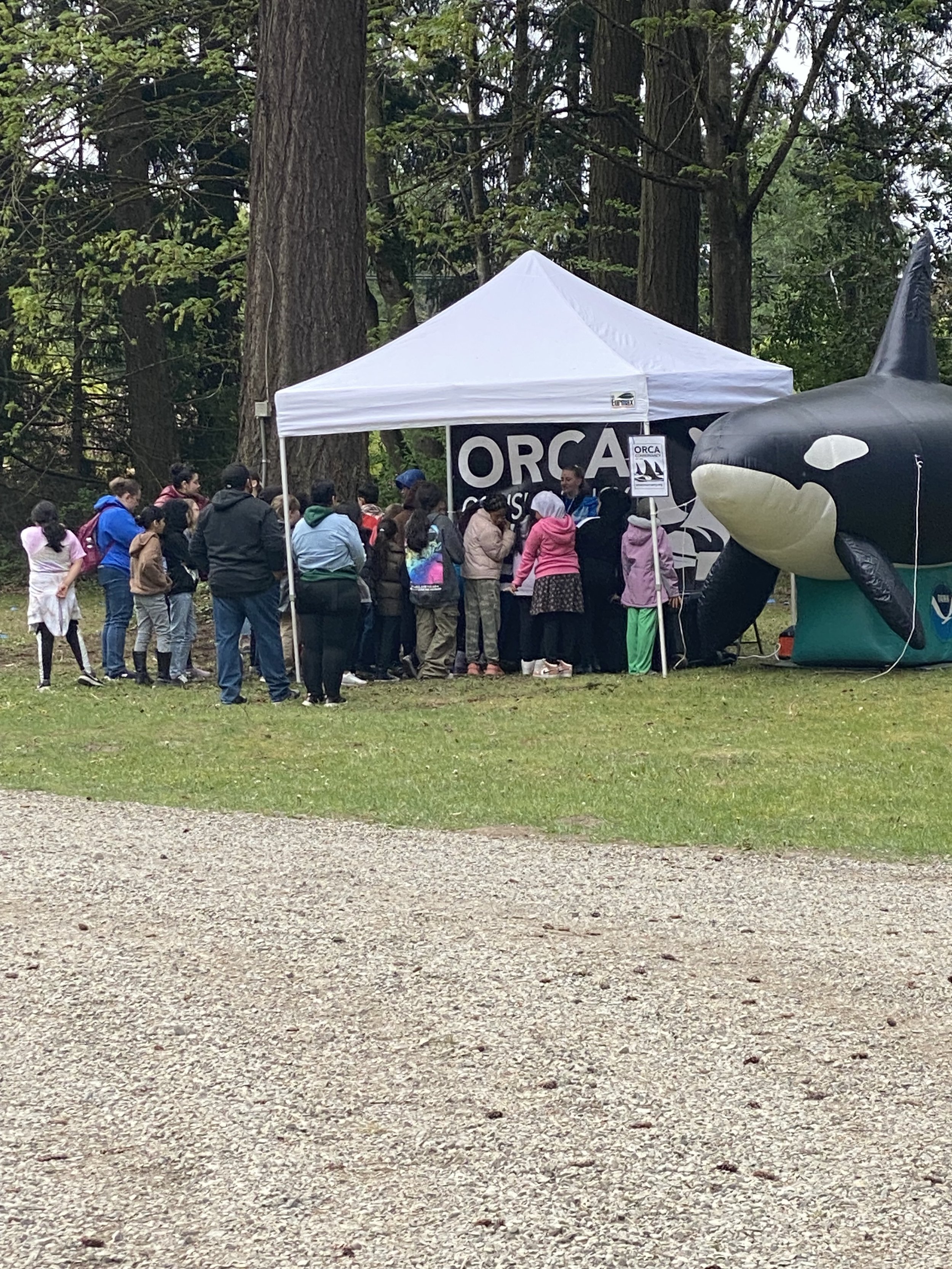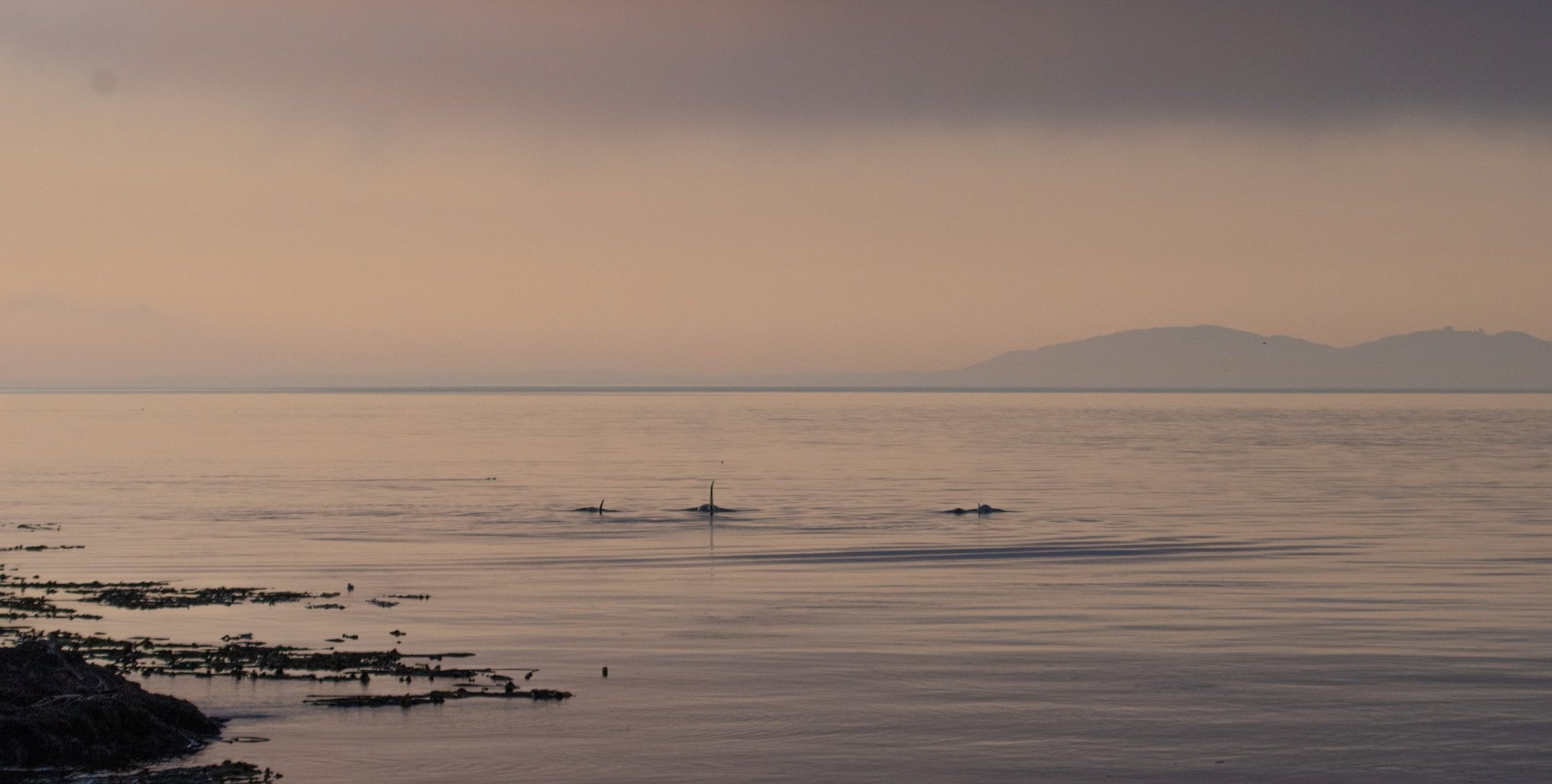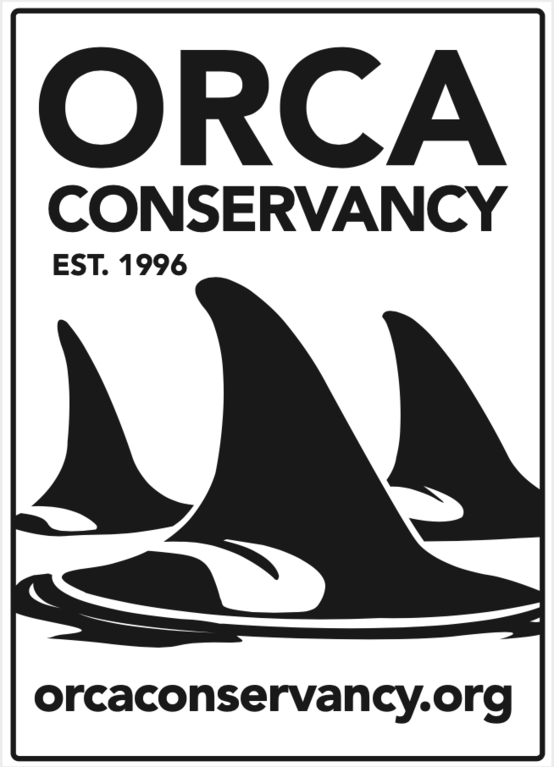
Initiatives and Projects
With the three major threats of prey scarcity, pollution, and vessel disturbance, as well as additional threats such as oil spills and climate change, Orca Conservancy has identified a variety of projects and initiatives to address these threats in order to help recover the critically endangered Southern Resident killer whale population.
Salmon Habitat Restoration:
Mitigated Threats: Prey scarcity, pollution
Wild, healthy Chinook salmon are the key to the critically endangered Southern Resident killer whale populations survival. Young fish migrate from freshwater streams and the river higher in the watershed to the estuary. In the estuary, they feed and their bodies adapt to salt water. Estuary habitat is particularly important for Chinook salmon, which are listed as "threatened" under the federal Endangered Species Act.
Volunteers removing invasive plant species and planting native trees at the Green-Duwamish River
Increased urbanization and development has led to more and more polluted runoff in rivers around cities, which are causing continued issues which do not support wild salmon or the areas vital for spawning, Here especially in the Puget Sound region, adult salmon are in dire need of cool waters as they travel up rivers to spawn. Additionally, juvenile salmon need cool waters as they make their first journey out into the ocean.
Riparian and habitat restoration projects are one of the many ways to mitigate the risk of warming river temperatures and toxic pollution runoff. By removing invasive plant species and replacing them with native plants, the ecosystem will allow for the natural ecosystem and fauna to flourish and survive. Native plants also play a key role in filtering pollution and toxic runoff from entering vital waterways. Planting trees around riparian areas helps to provide shade over creeks, streams, and rivers, which will help to keep water shaded and temperatures cool to allow fish species to survive.
AI Hydrophone Project:
Mitigated Threats: Vessel Disturbance, Military Takes
Vessel noise and disturbance is one of the top three major issues currently impacting the critically endangered Southern Resident killer whale populations recovery by impairing their ability to echolocate to hunt and find food, and communicate. The Salish Sea plays host to hundreds if not thousands of vessels a day ranging from ferries, oil tankers, cruise ships, private boats, and more, all of which flood the water with noise.
Orca Conservancy staff deploying hydrophones at the Edmonds site
In addition to the noise caused by daily traffic, in the summer of 2020 the National Oceanic and Atmospheric Administration (NOAA) approved the permit request of the United States Navy (USN) to continue military exercises throughout Puget Sound and along the coastal waters of Washington state posing a risk to the endangered Southern Resident killer whale (SRKW) population and other marine mammals. As part of the approved program changes the USN has been given exemption under the Marine Mammal Protection (MMPA) act with approval to increase the amount of “incidental takes” of SRKWs from 2 takes to a total of 51 takes over a period of 7 years (2020-2027).
An “incidental take” is defined as unintentional harassment, harm, hunting, capture, or killing of marine mammals throughout the duration of the planned exercises. The incidental takes are categorized into two levels; Level A harassment includes the potential to injure, harm or kill, while Level B harassment includes the potential to disturb or harass a marine mammal.
While no SRKWs have been approved under the Level A harassment (to injure or kill) there is still concern about the approval of 51 SRKW incidental takes under Level B (harass or disturb). Throughout the course of the permitted 7 years, the military is intending to test and train involving activities such as firing torpedoes and projectiles, detonating bombs, the use of sonar, piloting undersea drones and more. The major concern is that without an early warning system, the USN will not be able to suspend exercises in time, which would result in Level A takes rather than Level B takes.
In response to the regular vessel traffic and approved permitting, Orca Conservancy is working with multiple partners to install strategically placed hydrophones (underwater microphones) in Puget Sound and around the United States Navy’s Northwest Training and Testing site (NWTTS) located on the Washington coast.
Members of J Pod surfacing alongside the USS Halsey (DDG-97)
The hydrophones will be connected to AI technology which uses machine learning to detect and identify whale calls and notify a user who will then confirm whether or not the audio is a whale or another sound. Once calls have been detected and confirmed an alert will be sent out immediately to selected parties such as the U.S. Military, local ferries, government enforcement and research agencies, and shipping companies to notify parties of the presence of whales to allow vessels to cease dangerous activities (such as military testing) and slow down or re-route so to keep waters quiet to allow SRKWs to hunt and reduce any risk of harm.
Currently, Orca Conservancy has a single hydrophone deployed at Sunset Bay Beach Camp in Edmonds, Washington, and is currently in the process to install two new hydrophones in Seattle and in Rosario Strait (pending location approval and permitting).
Emergency Response:
Mitigated Threats: Oil/chemical spills, strandings, entrapments
The Southern Resident killer whale population faces multiple threats, making them particularly vulnerable to the increasing risk of oil or chemical spills within their critical habitat. With just a little over 70 individuals left, an oil spill could risk decimating the entire population and also pose a major danger to other ecotypes such as the transient killers, as well as other species and wildlife.
Dr. David Bain in Barnes Lake, Alaska for a response to free two trapped orcas
The critical habitat for the Southern Residents overlaps with many major shipping routes for container ships, oil tankers, and more traveling to and from US and Canadian waters. This traffic is expected to increase sevenfold with the near completion of Canadian projects like the Robert Banks Terminal 2 expansion, and the Transmountain Pipeline, which will increase exports and vessel traffic, in turn, increasing the risk of an oil spill or chemical spill.
To bolster preparedness in the Puget Sound region, Orca Conservancy is working with the United States Coast Guard and Federal and State agencies such as WDFW and NOAA to train responders on wildlife management and hazing during oil spills. With multiple responders and agencies being trained, this will allow for a larger coverage of a wildlife response in addition to the standard response protocols within a spill event and will aid in mitigating the risk of wildlife being exposed to dangerous chemicals.
Orca Conservancy has also participated in the response of orcas trapped in a saltwater lake in Alaska and has trained employees and scientists who are experienced in responding to strandings and entrapments and, are able to assist government agencies in responses as needed.
Water Temperature Testing:
Mitigated Threats: Prey scarcity, Climate change
Salmon and other species of fish like steelhead depend on cool water for survival. Cold water holds higher levels of oxygen which help salmon grow at a healthy rate. The amount of oxygen in water at equilibrium goes down as temperature goes up, which means warmer water has less oxygen that the salmon need. Having access to cool water during the freshwater migration phase increases the likelihood that summer-migrant salmon and steelhead will successfully complete their life cycle and to ultimately become Southern Resident killer whale food.
Dr. Dave training volunteers on how to take air and water temperatures at the Snoqualmie River.
Numerous Puget Sound Basin waterways are on the Clean Water Act 303(d) list of waters impaired for water temperature. These waters require the development of management plans to reduce water temperatures. Therefore, an important component for developing said plans is understanding where waters warm and where waters cool.
The Water Temperature testing project is a partnership with local communities and will be utilizing volunteers to collect water and air temperatures, and photographic records of the habitat of a designated location on the river once every month. The initial project is located in Snoqualmie, with plans to extend to other vital watersheds in the region including the Skagit, Green-Duwamish, and Sammamish rivers.
The goal is to increase public awareness of temperature as an indicator of water quality, and how temperature contributes to salmon survival. Results will also be used to help prioritize habitat restoration, and identify areas important to protect.
Boater Education:
Mitigated Threats: Vessel Disturbance
Online reports with real-time sighting information allow boaters increased access to killer whales. In many cases, resulting in interactions and in some cases harassment, that takes place outside areas where enforcement agencies are prepared to provide protection. While many want to experience the wonders of seeing whales in the wild, it is crucial that recreational boaters operate responsibly and safely around marine life to ensure the well-being of wildlife and boaters alike.
Orca Conservancy volunteers in Gig Harbor with Be Whale Wise guidelines to educate local boaters
In 2022, Orca Conservancy volunteers will again be stationed at various marinas and/or boat ramps within the San Juan Islands, and central/south Puget Sound between June and September to educate boaters on the newly revised Be Whale Wise Guidelines.
Included in the Boater Education Project will be a neighborhood watch-like program where trained volunteers will document vessel behavior. This will be accomplished in two ways:
by videotaping and measuring distances on the water between vessels and whales with a directional laser rangefinder from selected boats, and
by videotaping and measuring distances from land between vessels and whales with a directional theodolite at selected vantage points from land
Orca Conservancy has consulted with enforcement agencies (NMFS/NOAA, WDFW, Soundwatch).
Note: Citizens do not have enforcement authority. Therefore, we obtain and provide evidence and testimony to the federal, state, and county law enforcement agencies. They, in turn, can build a case and refer it for prosecution. This will be included in the training session(s).
More Ways We Help:
-
Research
Contributing to the scientific community through research and studies to better understand multiple ecotypes of orcas and how we can better protect them.

-
Education & Outreach
Hosting, attending, and speaking at community events to educate people on the endangered Southern Resident killer whales, wild salmon, and ways people can help.

-
Legislation
Advocating for meaningful action and policy to protect endangered Southern Resident killer whales, the habitat, and the wild salmon on which they depend.


Make a donation.
Help make our projects and initiatives possible by donating today.






